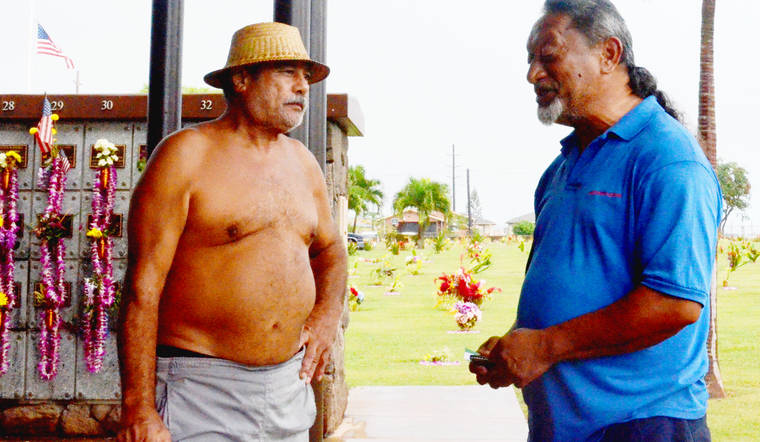HANAPEPE — Lambert Naka‘ahiki went to the Kauai Veterans Cemetery Monday afternoon and ran into an old childhood friend, Byron Wong.
The two men had grown up together on Kauai. Both joined the U.S. Air Force in the early 1970s. Naka‘ahiki started his six-year term in 1970 and was sent straight to Vietnam for a two-year tour.
“Confusion,” Naka‘ahiki said, describing what it was like when he landed in Da Nang. “From the time we left United States, going over there, it was just the monsoon season — the worst time of the year to travel. Worst time to even go in country. Monsoon season — rain like you never seen before. Water on the ground, all over the place.
“I mean, getting sent into Da Nang — nickname Rocket City. Why they call ‘em Rocket City? We found out that night. Forty-eight rockets. One of the largest rocket attacks they ever experienced. Not ever. They got more after that. But 48 rockets I faced the first night in Vietnam. I was scared as hell. I never know what was going on. All I know, the ground was just shaking, everything was vibrating, the impact was just unreal, ears just going crazy.”
The two veterans — Naka‘ahiki, 67, and Wong, 65 — showed up at the cemetery on Veterans Day, but neither man was there to visit the grave of a fallen soldier.
“I didn’t know he was here,” Naka‘ahiki said, nodding toward his old friend.
“I buried my wife and my daughter over here,” he said. “I missed her birthday last week. I was off island. So that’s why I’m here. Rain or shine I gotta be here. So I just had talked to my daughter. Told my daughter, take care of mom. Tell mom I was late, you know, she knows I late.”
“My wife, she’s buried here,” Wong said. “Dead. She died about two months ago.”
Wong also joined the Air Force two years after Naka‘ahiki in 1972 and served four years.
Wong and Naka‘ahiki sat under the pavilion while it rained and talked about their military experiences.
“I was loading up B-52s,” Naka‘ahiki said. “There was like 250-pound bombs on the wings, you know, 500 in the bellies. Then, they upgraded to 500 on the wings, 750s in the belly. Then, 750s on the wings, they put thousand-pounders in the belly. Then, thousand-pounders went out on the wings, and they would put fifteen-hundreds in the belly.”
He went on: “And sending them up to the same place! And they were just there the day before. And the structure is back up again! Unbelievable! They keep building ‘em!” he said. “Like Hanoi. Hanoi. We bombed, you know, that 13-day war, that all-out effort. We sent every bird we had, you know.”
On Dec. 13, 1972, peace talks between the United States and North Vietnam collapsed. Beginning on Dec. 18, American B-52s and fighter-bombers dropped over 20,000 tons of bombs on the cities of Hanoi and Haiphong. The United States lost 15 of its giant B-52s and 11 other aircraft during the attacks. North Vietnam claimed that over 1,600 civilians were killed.
“Two weeks later, I mean, not even a week later, they’re out,” Naka‘ahiki said, describing what he saw after the bombing campaign. “The market is open. They’re in the streets. The Hanoi Hilton — we didn’t touch ‘em. We didn’t touch ‘em. But every square inch around that baby, we just leveled everything. But yet …”
He paused and thought.
“You know, if we knew at our age, that time — we were so young going into the war, and if you knew anything, you know, the history of what went on in that country — I would have gone to Canada. Because, how we going fight a civilization that’s been fighting for centuries.”
“The French,” Wong added. “The French, then Nixon.”
“Fighting,” Naka‘ahiki said. “Fighting all their lives, and, and — combat.”
“It’s their country,” Wong said. “You’re fighting for your homeland!”
Naka‘ahiki said, “And they had a reason for fight. You know, we’re foreigners! Like the French. The French went in there and robbed those people. You know? They robbed ‘em! We didn’t know that. I didn’t know that until I got there!”
When asked how he felt when he arrived in Vietnam and started to realize what was going on, Naka‘ahiki said:
“You know, before we even got there, all the flack that the military was taking home here. I never know what the hell is going on. Especially being sent to United States of America — ‘The Big Island’ — and go through racial that I’ve never experienced over here.
“You know, I never understand what that was all about. You know, try to learn what’s going on ‘cause I gotta live with these guys. White against the black, you know. And I seen it right through my whole term in the service. Guys were dying because of that. And then we’re being sent to one place where the people had a good reason to fight — to die — because I think I would do the same.”
“They’re attacking your homeland, brudda,” Wong said.


